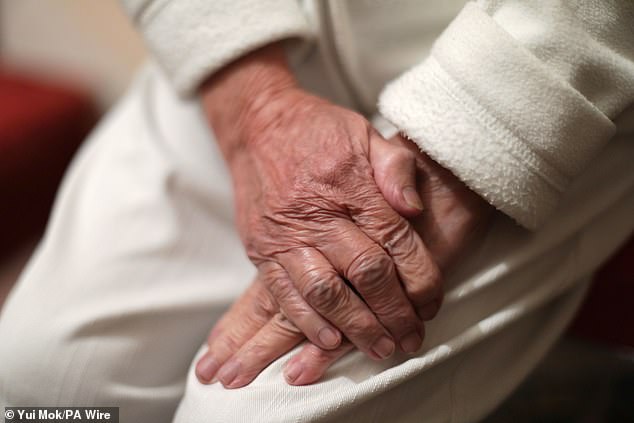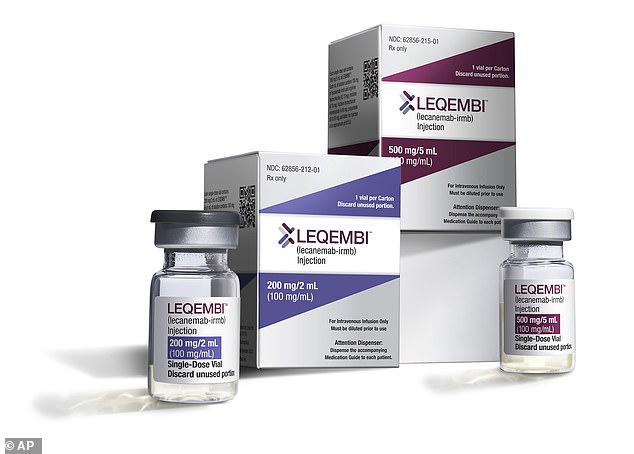Think twice before buying new ‘miracle drug’ for dementia, experts warn after reports emerged that two people in the US have died from suspected side effects in the past year







Patients have been warned not to turn to private pharmacies for a new ‘miracle cure’ for Alzheimer’s after reports emerged that two people have died in the US in the past year from suspected side effects.
The drug lecanemab slows the decline of the degenerative brain disease by about six months.
Last week the infusion drug was rejected by the NHS spending watchdog because the benefits were ‘too small to justify the costs’.
The National Institute for Health and Social Care Excellence (NICE) added that there are concerns patients should be monitored for ‘serious side effects’.

Last week the infusion drug was rejected by the NHS spending watchdog because the benefits were ‘too small to justify the cost’ (stock photo)

According to experts, about 3,000 patients have started taking the drug since it was approved by US health authorities in July 2023 (stock photo)
About one in 10 participants in the study experienced swelling in the brain and one in six had small brain hemorrhages, which in rare cases led to life-threatening symptoms. Three patients died in the study of 1,800 participants from suspected adverse events.
However, lecanemab, which costs an estimated £20,000 a year, will now be available privately in the UK. Experts predict thousands of desperate patients will turn to private providers for lecanemab, but warn they could be putting their health at risk.
Earlier this month, at the Alzheimer’s Association International Conference in Philadelphia, it was reported that two patients in the US had died from suspected adverse reactions after taking lecanemab.
About 3,000 patients have started taking the drug since it was approved by U.S. health authorities in July 2023, experts say.
One death was confirmed by Dr. Lawrence Honig, a neurologist at Columbia University in New York. A second death was reported by the science news website Alzforum. Neither patient has been identified, but Dr. Honig said one of them carried a gene — called APOE4 — that research shows puts patients at greater risk of brain hemorrhages. About 15 percent of Alzheimer’s patients carry the gene.

Lecanemab, which costs an estimated £20,000 a year, will now be available privately in the UK (stock photo)

Lecanemab and donanemab work by attacking a toxic protein in the brain called amyloid, which is linked to dementia symptoms
“Anyone who has the money to buy this drug privately should carefully weigh up the pros and cons and decide whether it is worth taking lecanemab,” said Robert Howard, professor of geriatric psychiatry at the Institute of Mental Health at University College London.
“People think it will buy them more time, but the data shows only a marginal benefit. Meanwhile, the risks are very real.”
There are one million Alzheimer’s patients in the UK and there are currently no NHS treatments that can slow the disease. Lecanemab – and a similar drug called donanemab – are the first treatments shown in trials to combat the loss of brain function caused by Alzheimer’s.
The drugs are given as an infusion every two weeks. Lecanemab and donanemab work by attacking a toxic protein in the brain called amyloid, which is linked to dementia symptoms.
Last year, when trial results for both drugs were announced, experts said the findings marked the “beginning of the end” for Alzheimer’s. Since then, however, the treatments have been dogged by controversy. The MoS was the first to report on the death of 79-year-old lecanemab trial participant Genevieve Lane from Florida, who suffered a fatal attack in 2022, just a week after her third dose. An autopsy concluded that lecanemab had likely triggered the burst blood vessel in Genevieve’s brain, leading to her death. Two other deaths in the trial were linked to side effects. Earlier this year, this newspaper also revealed that senior NHS officials had raised concerns that rolling out the treatments could cost the taxpayer £1bn a year and also endanger the lives of Alzheimer’s patients.

Lecanemab, sold under the brand name Leqembi, is a monoclonal antibody drug used to treat Alzheimer’s disease.

There are one million Alzheimer’s patients in the UK and there are currently no NHS treatments that can slow the disease
According to an NHS report, the drugs were only effective if given at the very earliest stages of the disease. The report also suggested that monitoring patients for possible side effects could take up significant resources.
When NICE decided last week not to introduce lecanemab to the NHS, it cited these concerns. Dr Samantha Roberts, head of NICE, said: ‘It’s an intensive treatment to give patients, requiring them to go into hospital every two weeks and skilled staff to monitor them for signs of serious side effects, plus the cost of buying the drug.’
A spokesman for Eisai, the company that makes lecanemab, said: ‘The second death described in the media was acknowledged as a rumour by the news outlet that first reported it.
‘Eisai is not in a position to comment on rumors. Eisai continues to meet our obligations to monitor and report adverse events in accordance with global regulatory requirements.’




